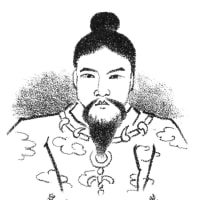『日本書紀』齋明天皇 5
夏四月、阿陪臣闕名率船師一百八十艘伐蝦夷、齶田・渟代二郡蝦夷望怖乞降。於是、勒軍陳船於齶田浦、齶田蝦夷恩荷進而誓曰「不爲官軍故持弓矢、但奴等性食肉故持。若爲官軍以儲弓失、齶田浦神知矣。將淸白心仕官朝矣。」仍授恩荷以小乙上、定渟代・津輕二郡々領。遂於有間濱、召聚渡嶋蝦夷等、大饗而歸。五月、皇孫建王、年八歲薨。今城谷上、起殯而收。天皇、本以皇孫有順而器重之、故不忍哀傷慟極甚。詔群臣曰、萬歲千秋之後、要合葬於朕陵。廼作歌曰、
伊磨紀那屢 乎武例我禹杯爾 倶謨娜尼母 旨屢倶之多々婆 那爾柯那皚柯武 其一
伊喩之々乎 都那遇舸播杯能 倭柯矩娑能 倭柯倶阿利岐騰 阿我謨婆儺倶爾 其二
阿須箇我播 瀰儺蟻羅毗都々 喩矩瀰都能 阿比娜謨儺倶母 於母保喩屢柯母 其三
天皇時々唱而悲哭。
≪英訳≫
In the fourth month of summer, Abe no Omi (阿陪臣) led a naval force of 180 ships to attack the Emishi (蝦夷). The Emishi of the two districts of Akita (齶田) and Noshiro (渟代) looked from afar and, overwhelmed with fear, begged to surrender.
In response, the imperial army arranged their ranks and anchored the ships at Akita Bay (齶田浦). Then, a leader of the Akita Emishi named Oga (恩荷) stepped forward and swore an oath, saying:
“We do not bear bows and arrows to resist the imperial army. It is simply that our people, by nature, consume meat and thus carry such weapons. If we were to aim our arrows at the imperial army, surely the deity of Akita Bay (齶田浦) would punish us. We pledge to serve the imperial court with pure and honest hearts.”
Accordingly, Oga was granted the court rank of Shōotsu-no-jō (小乙上), and was appointed district governor (kōri no miyatsuko) over the two regions of Noshiro (渟代) and Tsugaru (津軽).
Later, at the beach of Arima (有間), the Emishi from Oshima (渡嶋) were summoned and gathered. They were grandly feasted and then allowed to return home.
In the fifth month, the imperial grandson, Prince Takeru (建王), passed away at the age of eight. His remains were placed in a temporary burial palace (殯宮) at the bank of the Imaki Valley (今来谷).
The Emperor had always cherished the prince for his gentle and obedient nature, and thus she could not endure the grief—her sorrow and lamentation were extreme. She issued a command to her ministers, saying:
“In the ages to come, bury him together with me in my own tomb.”
Then, Her Majesty composed the following songs:
Song I:
Upon the low hill of Imaki,
If only the clouds would rise up clearly,
What cause would there be for lamentation?
Song II:
The deer I chased and tied by the river—
Like the tender young grasses of spring,
I never thought of him as but a child—
Yet now he is no more.
Song III:
As the Asuka River swells and flows,
Never ceasing for even a moment,
So too do my thoughts of him
Flow on, unending.
The Emperor would sing these songs from time to time, and weep with sorrow.
≪この英文の和訳≫
夏四月、阿陪臣(あべのおみ)は船団百八十艘を率いて蝦夷(えみし)を討伐した。齶田(あきた)および渟代(のしろ)の二郡の蝦夷は、遠くから官軍の威容を望み見て、恐れおののき、降伏を乞うた。
このため、軍勢は整列し、船団は齶田浦(あきたのうら)に碇を下ろして布陣した。そのとき、齶田の蝦夷の恩荷(おが)という者が進み出て、誓って言った。
「我らが弓矢を携えているのは、決して官軍に敵対せんがためではない。ただ我らの習性として、日頃より肉を食するため、これを持つのである。もし官軍に向かって弓を射るようなことがあれば、齶田浦の神が必ずや咎め給うことであろう。我らは潔白なる心をもって、帝(みかど)にお仕え申す所存である」
これにより、恩荷には小乙上(しょうおつのじょう)の位が授けられ、渟代(のしろ)と津軽(つがる)の二郡の郡領(こおりのみやつこ)に任ぜられた。
その後、有間(ありま)の浜において、渡嶋(おしま)の蝦夷らを召し集めて、大いに饗応し、それぞれ帰らせた。
五月には、皇孫・建王(たけるのみこ)が八歳にして薨去あそばされた。御遺骸は今来谷(いまきのたに)の岸辺に殯宮(もがりのみや)を建てて納められた。
天皇は、皇孫の御心の美しさを深く愛しておられたゆえに、その喪失の悲しみを忍び難く、御慟哭はまことに激しかった。群臣に詔(みことのり)を下して、次のように仰せられた。
「我が世を去った後には、必ずこの皇孫と同じ陵に合葬せよ」
そして御製の歌を詠まれた。
第一首:
伊磨紀那屢 乎武例我禹杯爾 倶謨娜尼母 旨屢倶之多々婆 那爾柯那皚柯武 其一
いまきなる をむれが上に 雲だにも しるくしたたば なにか嘆かむ
(今来の小丘の上に、せめて雲だけでもはっきりと立ち上がるならば、何をこれ以上嘆こうか)
第二首:
伊喩之々乎 都那遇舸播杯能 倭柯矩娑能 倭柯倶阿利岐騰 阿我謨婆儺倶爾 其二
いゆししを つなぐ川辺の 若草の 若くありきと 我が思はなくに
(射かけた鹿を追って辿った川辺の若草のように、幼かったとは私は思っていなかったのに)
第三首:
阿須箇我播 瀰儺蟻羅毗都々 喩矩瀰都能 阿比娜謨儺倶母 於母保喩屢柯母 其三
飛鳥川(あすかがわ) みなぎり流れ 行く水の 間もなくも 思ほゆるかも
(飛鳥川が満ち溢れて絶え間なく流れるように、我が子のことも絶えることなく思い出される)
天皇はこの歌を時折お詠みになり、深く御悲嘆あそばされたのである。
令和7年7月7日(月) 2025













